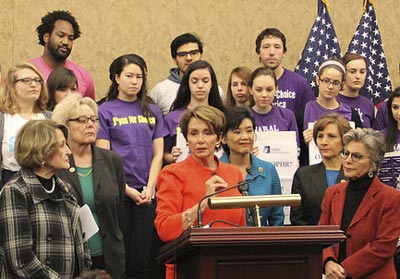
The propensity of anti-choice advocates to eulogize false science was on full display on Tuesday’s Senate hearing on the Women’s Health Protection Act (WHPA). That bill is a bold measure that would counter the relentless barrage of anti-choice legislation that has made abortion – a constitutionally protected medical procedure – all together inaccessible for many U.S. women.
The bill was introduced last year by Senators Richard Blumenthal and Tammy Baldwin and Representatives Judy Chu, Lois Frankel and Marcia Fudge. It prohibits states from applying regulations to reproductive health care centers and providers that do not also apply to other low-risk medical procedures. It would, essentially, remove politicians from decisions that – for every other medical issue – remain between individuals and their providers.
The WHPA is long overdue. For the past three years, conservative lawmakers have used the guise of protecting women’s health to pass more than 200 state laws that have closed clinics, eliminated abortion services, and left women across the country without access to critical reproductive health care. The WHPA would reverse many of those policies and prevent others from being passed.
Tuesday’s hearing was representative of the broader debate over abortion rights. Those in favor of the bill argued that securing guaranteeing unfettered access to reproductive health care, including abortion, is critical to the health and lives of U.S. women and their families.
Those in opposition used familiar canards about abortion to argue the law would be calamitous for U.S. women. Representative Diane Black of Tennessee had the gall to make the abortion-leads-to-breast cancer claim, one that has been disproven many times over. Others repeatedly cited the horrific cases of Kermit Gosnell, insinuating that all abortion providers (abortionists, in their lingo) are predatory and that late term abortions are a common occurrence. In fact, if women had access to safe, comprehensive and intimidation-free care, Kermit Gosnell would have never been in business. Given the opposition’s testimony, you’d never know that late term abortion is actually a rarity. According to the Centers for Disease Control, more than 90 percent of all abortions occur before 13 weeks gestation, with just over 1 percent taking place past 21 weeks.
At one point Representative Black argued that abortion is actually not health care. The one in three U.S. women who have undergone the procedure would surely argue otherwise.
Perhaps the most ironic testimony against the WHPA – and in favor of abortion restrictions – came from Senator Ted Cruz, who hails from Texas, a state with so many abortion restrictions that women are now risking their health and lives by self-inducing abortions or crossing the border to get care in Mexico. Senator Cruz attempted to validate U.S. abortion restrictions by referencing a handful of European countries with gestational restrictions on abortions. This was a popular argument during the hearing for Texas’ HB2 – the bill responsible for shuttering the majority of clinics in that state.
Cruz wins the prize for cherry picking facts to best support his argument. When citing our European counterparts, he conveniently ignored that such abortion restrictions are entrenched in progressive public health systems that enable all individuals to access quality, affordable (often free) health care, including comprehensive reproductive healthcare. Senator Cruz and his colleagues have adamantly opposed similar policies in the U.S., particularly the Affordable Care Act’s provisions for contraceptive coverage and Medicaid expansion. On the one hand conservatives lean on European policies to argue for stricter abortion restrictions at home, and on the other they claim those policies are antithetical to the moral fabric of the United States.
Would Cruz support France’s policies that enable women to be fully reimbursed for the cost of their abortion and that guarantees girls ages 15 to 18 free birth control? Or Belgium’s policy that enables young people to be reimbursed for the cost of emergency contraception? Or the broad exceptions both countries make for cases of rape, incest, and fetal impairment, to preserve woman’s physical or mental health, and for social or economic reasons? He absolutely would not.
Given the House of Representatives seems to be more motivated by suing the President than by voting on – let alone passing – laws that will actually improve the health and lives of their constituents, it’s highly unlikely the WHPA will become law. But Tuesday’s debate – and the bill itself – is significant and shows a willingness among pro-choice advocates to go on the offense after too many years of playing defense.
Bills such as the WHPA – even if they face a slim chance of being passed by a gridlocked Congress – provide an opportunity to call out conservatives’ use of bad science in their attempts to convince women that lawmakers know best when it comes to their personal medical decisions. And they allow us to remind lawmakers and citizens that despite all of the rhetoric to the contrary, abortion is a common, safe and constitutionally protected medical procedure, and that regulating it into extinction will only force women into back-alley practices like those run by Gosnell, costing them their health and their lives.
Those in support of the WHPA showed anti-choice lawmakers that the days of make a sport of trampling women’s health and rights are numbered.
24 Hours Left: All gifts to Truthout now matched!
From now until the end of the year, all donations to Truthout will be matched dollar for dollar up to $18,000! Thanks to a generous supporter, your one-time gift today will be matched immediately. As well, your monthly donation will be matched for the whole first year, doubling your impact.
We have just 24 hours left to raise $18,000 and receive the full match.
This matching gift comes at a critical time. As Trump attempts to silence dissenting voices and oppositional nonprofits, reader support is our best defense against the right-wing agenda.
Help Truthout confront Trump’s fascism in 2026, and have your donation matched now!